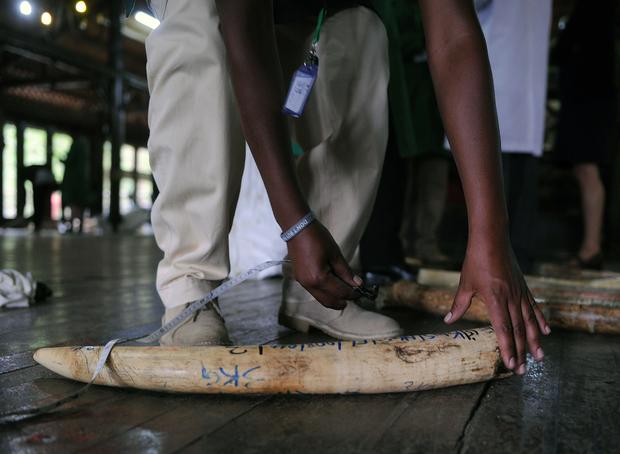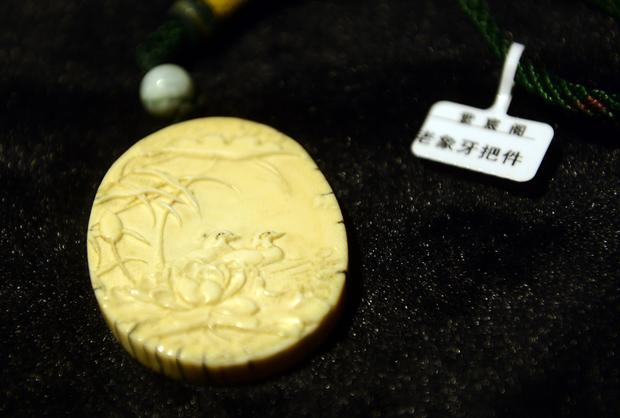Proposed U.S. ban on ivory trade faces powerful foe
If elephants disappear from the wild, two countries will largely be to blame -- the U.S. and China, with consumers in both countries feeding skyrocketing demand for illegally poached tusks.
"In China, a small amount of ivory can go for $1,300 -- a pair of tusks can go for $20,000. It depends on what stage -- it's cheaper when sold to a middle man. Carved, it can sell for tens of thousands of dollars," Wayne Pacelle, president and CEO of the Humane Society of the United States, told CBS MoneyWatch.
In China, where ivory has for centuries been used to make carvings and jewelry, many believe obtaining the material is like extracting a tooth, with no harm done to the elephant, Pacelle added.
In fact, one of the mammals is killed every 15 minutes for its ivory. In 2012, an estimated 30,000 elephants were killed for their tusks.
The prices fetched for ivory fuel illegal activity and involve terrorist groups, such as Al-Shabab militants coming from Somalia into Kenya, a nation known for its safaris and where tourism accounts for 12 percent of its economy. Kenya has also seen its elephant population decline from 175,000 in the 1970s to about 35,000 today.
While China is the world's biggest market for ivory, demand for the material remains strong in the U.S., the second-largest market. President Obama would like to change that.
During his recent visit to Kenya, he announced the U.S. would establish a nearly complete ban on commercial ivory trade, with the new rules designed to get rid of, or severely curtail, the legal means used by poachers and traffickers to profit from illegally obtained ivory.
"At the moment there is no limit on the number of trophies (tusks) that can be brought back per hunter. The proposed rules are two per-year per hunter," said Gavin Shire, chief of public affairs for the U.S. Fish and Wildlife Service. Trophy imports from Zimbabwe and Tanzania are currently suspended.
Tanzania's elephant population has dropped by more than 60 percent during the past five years, according to its government, with the East African nation's elephant population estimated at 43,330 at the end of 2014, down from 109,051 in 2009.
The administration's proposal, which would not take effect after a 60-day public comment period, would restrict the sale of elephant ivory across state lines and further curb commercial exports.
The proposed rules face opposition from the National Rifle Association, which objects to potential restrictions on guns with ivory handles, often passed down through families. Federal and state efforts to ban ivory often involve "taking a legally owned possession, and making it illegal. In may instances, it takes law abiding citizens and makes them criminals," said Jennifer Baker, a spokeswoman for the NRA.
"It's overheated rhetoric, as usual from the NRA," the Humane Society's Pacelle said. "But as more and more Republicans recognize, it's not just a humane and conservation issue, but also a matter of national security. Groups that are terrorizing communities and threatening governments in Africa are all implicated in the ivory trade, either by killing elephants or by being brokers to sell the ivory."
"Poachers with ties to global organized crime syndicates and violent groups continue to cross international borders to kill elephants and rhinos for their tusks and are better equipped than the park rangers who are charged to protect them," Massachusetts Senator Ed Markey, a Democrat, told a U.S. Senate subcommittee hearing on wildlife poaching on July 16, adding that rangers have died in encounters with poachers armed with "weapons of war, military grade weaponry and technology."
In an alert posted on its website this month, the NRA asked supporters to contact their lawmakers in support of legislation introduced in both the U.S. Senate and the U.S. House of Representatives to halt the ban on the sale and trade of legally owned ivory in the United States.
Introduced in the Senate by Republicans Steve Daines of Montana and Tennessee's Lamar Alexander, the bill would also "ensure that sport-hunted elephant trophies can be imported from countries with sustainable elephant populations," the NRA said in its alert.
"I don't support treating musicians, antique shops and firearms sellers like illegal ivory smugglers," Alexander said in statement announcing the legislation, introduced July 15 and referred to the Senate Committee on Environment and Public Works.
U.S. Rep. Don Young, a Republican from Alaska, in February introduced companion legislation in the House, where it was referred to a subcommittee.
The NRA has also actively campaigned against state bans on ivory, an issue not addressed by federal rules, which don't cover ivory commerce within a state's borders. That loophole closed last year in New York, while a ban in on ivory sales also took effect in neighboring New Jersey in February.
In California, legislation that would prohibit sales of ivory passed the state House and is currently before a state Senate panel. The legislation is designed to close loopholes that have let the illegal sale of ivory to continue, according to its sponsor, Toni Atkins, a Democrat from San Diego.
In Washington State, a measure supported by Microsoft co-founder Paul Allen that would ban the sale of products from 10 endangered animals including elephants will be on the ballot in November.
The Obama administration's proposed rules would only allow for the sale of ivory across state lines if it meets the antiques exemption in the Endangered Species Act, which requires it be 100 years or older. Some manufactured goods with small amounts of ivory, such as ivory-handled guns and musical instruments, would still be allowed after lobbying efforts by groups affected.
Ivory carvings and ivory components such as knife handles, billiard cues and furniture are sold in U.S. retail shops as well as through online sellers, and according to the wildlife service, it's exceedingly difficult to differentiate legally acquired ivory from that derived from elephant poaching.
"Our criminal investigations and anti-smuggling efforts have clearly shown legal ivory trade can serve as a cover for illegal trade," according to the agency. "As just one example, Service and state officers seized more than $2 million-worth of illegal elephant ivory from two New York City retail stores in 2012."
Much of the ivory illegally imported into the United States comes by way of China, with U.S. demand for ivory apparently indirectly adding to China's demand, according to a study published by British-based conservation group Care for the Wild International (CWI). The report also noted that there are more ivory crafters in the U.S. than in Europe, and that they acquire ivory through the Internet, auctions and estate sales, which are largely unregulated by U.S. officials.
Research funded by U.K.-based Save the Elephants a year ago showed the price of ivory in China, the world's biggest market, has nearly tripled in four years, with the average price paid for good quality, privately owned 1-4 kilogram elephant tusks in Beijing fetching $2,100 per kilogram in early 2014. The average price in 2010 was $750 per kilogram.
"With the ivory price in Africa a tenth of that reached in China, substantial profits are being generated for organized crime that fuels insecurity, corruption, and deprives local communities of valuable income," the group said in a statement. "Save the Elephants estimates that an average of 33,000 elephants were lost to poachers every year between 2010 and 2012."
In March, the Chinese government took another step to curtailing the market, with the State Forestry Administration imposing an immediate ban on African ivory carving imports to mainland China.

